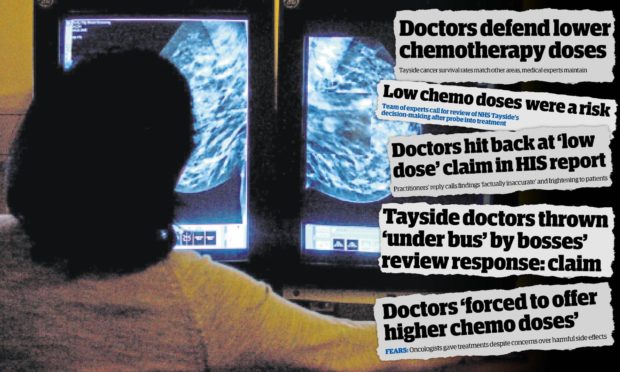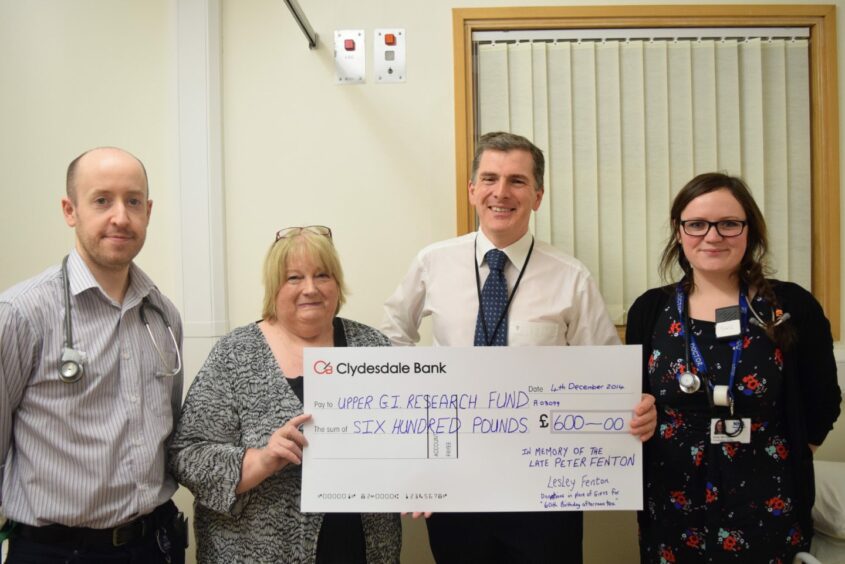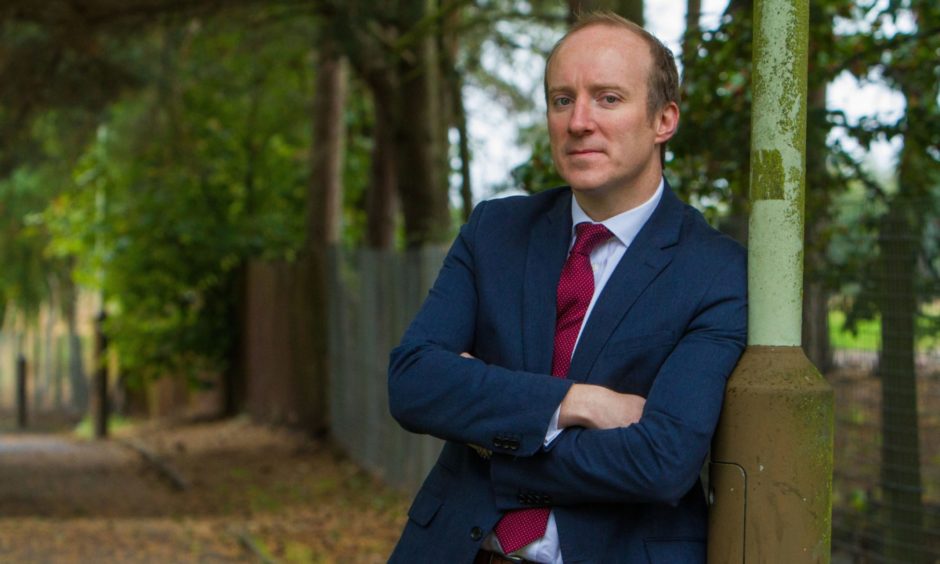Tayside health chiefs have been warned the “decimation” of breast cancer services in the region will cost lives after another senior doctor announced he is leaving the beleaguered department.
Dr Douglas Adamson has notified bosses he will retire in January, despite being only 57 years old, meaning the service will be reduced to a single consultant who was recruited in August.
Dr Adamson is the last remaining member of the oncology team who accused management of throwing them “under the bus” amid a long-running scandal about lower-than-standard chemotherapy doses.
We can exclusively reveal investigations by the General Medical Council have effectively cleared individual team members over use of the doses and found the clinicians involved behaved appropriately despite not telling patients about the practice.
The explosive findings raise further questions about the working culture within NHS Tayside, which was forced to ask other boards for help after its chief executive said he was unable to guarantee the future of the service in the wake of several resignations.
A service in turmoil
The oncology department was thrown into turmoil in early 2019 following the revelation that around 200 patients were given lower-than-standard doses of chemotherapy drugs in a bid to reduce harmful side effects.
The doctors lowered the dose after an internal audit in 2015 found significant toxicity and the need for a reduction in half of their patients.
The decimation of this vital service is a long and sorry story of management failings and an inept SNP Government.”
Michael Marra
A Scottish Government-commissioned review said the treatment resulted in a 1-2% increased risk of their cancer recurring but a series of investigations by us revealed one of the experts behind the claim later privately admitted it was “flawed, probably, but the best that could be done, really”.
Doctors in Tayside claimed the review was “deeply flawed”, reported being physically threatened following its publication and hit out at bosses for accepting the findings despite their concerns.
What did the GMC investigation find?
We can reveal a GMC investigation into the consultants at the heart of the controversy notes that while the majority of cancer centres use a higher dose, “there are other accepted regimens using other doses”.
It states the outcomes of using lower doses “have largely not been compared in clinical trials and therefore cannot be said to offer proven inferior outcomes”.
Several government-ordered reviews – many of which have been disputed – concluded the doctors believed they were acting in the best interest of their patients by reducing the dose but there was a lack of fully-informed consent around the practice.
However, the GMC said it “would not be normal practice for an individual consultant to discuss with a given patient the differences in chemotherapy doses recommended or the other possible regimens available either in their centre or at another centre”.
It stated that even if a doctor was aware of the alternative regimens available at other centres, “it would not be normal practice to discuss with patients the availability of these treatments unless it was considered these treatments were superior and therefore in the patient’s best interests”.

NHS Tayside said it would not comment on the report, as it is a “confidential matter between the individual doctor, their regulatory body and the individual who made the referral” to the GMC.
Patients and families affected by the 2019 dosing scandal have repeatedly called on health secretaries and Nicola Sturgeon to meet them as part of their ongoing search for answers but to date not a single meeting has been arranged.
‘Time to get a grip of the chaos’
Ms Sturgeon said earlier this year it would not be “acceptable or appropriate for women in Tayside to have to travel long distances for essential breast cancer support and care”.
North East MSP Michael Marra urged the Scottish Government to step in “to finally get a grip of the chaos they have caused”.
He said: “We cannot allow this to be a fatal blow to Dundee’s breast cancer service and to local women.
“The decimation of this vital service is a long and sorry story of management failings and an inept SNP Government.
“It is women in Tayside and their families that will suffer the consequences.
“The time for action at the very highest level arrived long ago, but if it does not happen immediately then lives will certainly be lost.
“It is now nine months since Nicola Sturgeon said she would look into the issue, and the situation has only deteriorated further and faster.”
‘We know the harm this will cause’
Mr Marra said he had been told by local staff that the situation could mean women being forced to travel further for the treatment they need.
“Some women, particularly from the most deprived backgrounds, don’t and won’t travel.
“We know the harm this will cause,” Mr Marra added.
An NHS Tayside spokeswoman said the health board “currently offers a full breast oncology service with all patients seen here in Tayside”.
“A new consultant breast oncologist started in August this year and recruitment is ongoing for clinical and medical oncologists,” she said.
“Our priority remains that we continue to deliver a service for patients in Tayside.”
Timeline: How we investigated the NHS Tayside breast cancer treatment scandal
- December 2016 to March 2019 – Around 200 breast cancer patients are given lower-than-standard doses of chemotherapy by NHS Tayside doctors. Fourteen die during this period.
- January to April 2017 – Dr Adrian Harnett is recruited by NHS Tayside for an internal review after a whistleblower raises concerns. The review is favourable to the oncologists and later leads Dr Harnett to sign a letter in their defence.
- May 2017 – NHS Tayside contacts Healthcare Improvement Scotland (HIS) after the whistleblower remains dissatisfied following the review.
- November 2018 – The Royal College of Radiologists nominates Dr Harnett to be the clinical oncologist panel member for a separate Royal College of Physicians (RCP) invited service review.
- April 2019 – HIS releases its report and the findings are fully accepted by NHS Tayside and the Scottish Government. The oncologists say they have been “thrown under the bus” by the handling of the revelations and brand it “factually inaccurate” in a detailed response later obtained by The Courier.
- The Scottish Government and chief medical officer are made aware of Dr Harnett’s conflict of interest. The RCP is also told but states it has incomplete information so the review goes ahead, anyway.
- A Scottish Government-commissioned review group states patients were put at a 1-2% increased risk of seeing their cancer return. The finding is disputed by experts and the oncologists but is accepted by NHS Tayside and ministers. The same month, doctors in Tayside say they have been forced to offer the stronger chemotherapy doses against their own professional judgement.
- June 2019 – The RCP receives further details of Dr Harnett’s potential conflict of interest through its ‘raising concerns’ mechanism. A complaint is also made to the General Medical Council (GMC).
- July 2019 – An independent review to fully consider the HIS findings sets out 19 recommendations, one of which states patients should be explicitly warned about the risks of variation in their care from generally accepted guidelines.
- August 2019 – It emerges a probe into the treatment of the 14 patients who died found it was “unlikely” it had an effect on their prognosis. The findings are not released publicly but are obtained by The Courier.
- September 2019 – It emerges one of the experts behind the 1-2% increased risk statement privately admitted the finding was “flawed, probably, but the best that could be done really”.
- The GMC considers there is no conflict of interest in relation to Dr Harnett’s involvement in the invited service review and closes its case.
- October 2019 – The Courier reports that the long-awaited invited service review will never be published due to the conflict of interest. Three days later, we exclusively publish the details of the review, including calls for psychological support for staff left distressed by the treatment revelations.
- The Courier learns the GMC is investigating NHS Tayside’s interim medical director, Professor Peter Stonebridge, his deputy, Professor Colin Fleming, and four members of the oncology team.
- November 2019 – A group of patients and family members reveal plans to sue NHS Tayside over their care and hit out at a “catastrophic breakdown in communication” with officials.
- January 2020 – The RCP writes to Dr Harnett, stating a serious disciplinary offence occurred due to his failure to declare a conflict of interest in advance of the invited service review visit. The complaint allegation is upheld and Dr Harnett is ordered to pay back his fee for the review. This prompts the GMC to reopen and “promote” the case.
- June 2020 – The GMC puts a range of allegations to Dr Harnett, including that his conduct had been dishonest when signing a declaration on the invited service review conflict of interest form.
- July 2020 – Dr Harnett writes to the GMC to state his recollection of events. Two days later he applies for voluntary erasure from the medical register, citing ‘retirement’ as the reason.
- March 2021 – NHS Tayside chief executive Grant Archibald tells MSPs on Holyrood’s public audit committee he is unable to make long-term promises about cancer care in the region following the departure of several individuals from the health board’s oncology team.
- Later that month, Nicola Sturgeon says she wants cancer services to have a “long-term future” in Dundee, as it’s revealed NHS Tayside has been forced to ask boards for help to shore up care.


